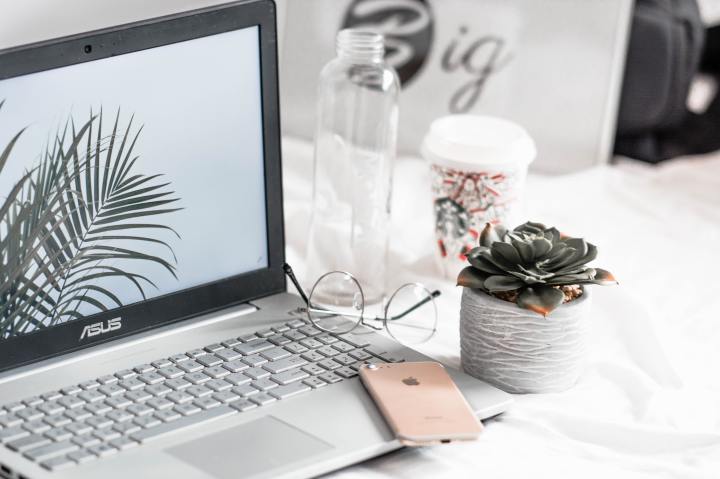Working From Home

I’ve been working from home for over twenty years so it’s interesting to listen to the current commentary on the joys and difficulties of being a home worker, along with the suggestions for making this transition easier and more productive.
Much of the conversation is focussed on maintaining your working space and keeping regular working hours. It took me time to create my own space – initially I started off writing in the converted garage which was cold and inhospitable but did make me extremely productive as it wasn’t a place to while away the hours fruitlessly. I don’t recommend it as a long-term solution, but there’s no doubt you need to have somewhere that’s designated a work area even if it’s just the corner of your living-room, so that your brain kicks into a different place when you’re there.
Social media is full of the joys of working in your tracksuit or your jammies, but I like to get dressed properly. Not, obviously, in the suits that were part of my office persona, but I have a morning routine of breakfast, exercise, shower and putting on my working clothes (usually jeans and a t-shirt, to be fair) that gives my mind time to settle into the day ahead. When I worked in an office, my commute was the time when my mind organised itself for the day ahead, but when the commute is simply into the next room – joyful though that is – it’s not an option. So a morning routine is good.
People ask if writers need to be very disciplined or if we only work when the muse is there. I’m not sure which writer said that writing when the muse struck was his way of going about it and he ‘made sure it struck at 9am every morning’ but it’s true. Those 100k words aren’t going to write themselves. For me, having a routine and getting dressed is the best way about doing things, and although many of my now working-from-home friends say that they can set their hours to suit themselves (which is great) I think it’s important to have a very definite marker between work time and home time. I try to make this work for me but it doesn’t always. I can spend a whole day faffing around on a single scene and abandon it as a lost cause, only to suddenly realise what’s wrong in the middle of dinner and then rush off to fix it.
The two biggest moans I’ve always had about home working are (1) that because I’m at home nobody thinks I’m actually doing anything much and (2) there’s no IT or other support which means having to learn a whole heap of additional skills.
At least with everyone working from home now, people accept that just because you’re not in the office it doesn’t mean you’re whiling your time away on social media or home shopping sites. And social distancing means not being asked if you could just ‘do this little thing’ because you’re at home and you can be flexible. Obviously my flexibility means I can rush to fix a plot line during dinner but being flexible to someone else’s tune is entirely different. The truth is, if you’re home working because you work for yourself, flexibility is built in. You expect it. But if you’re working for your company you have to make the flexibility compatible with your home life too.
To be honest I envy those who have a corporate structure behind their working from home. The amount of time I’ve wasted because of some random technical glitch – usually involving the printer or an app that won’t work properly – is mind boggling. I long for the days when I could ring up Gerry in IT and have him tell me to switch it off and switch it on again. I’ve done that Gerry, thanks to your great advice in the past, but it still isn’t working! Actually I’ve become adept at trouble shooting but I never intended to be my own IT department. I’m my own post department too. My own social department. My own stationery department. My own HR department. My own everything. And sometimes I lose my focus and forget that the only thing that really matters is actually writing the book. So I have to remind myself not to sweat the small stuff and leave whatever I can’t do until later. At which point I usually figure out a workaround.
Working from home means having to be the grown up in the room. Having to plan your schedule, having to set your own deadlines, having to combine two kinds of living in one space. It has its challenges and its rewards. It means having to think – as we would in corporate-speak – outside the box. It also means cutting yourself some slack, allowing yourself to have breaks, to congreate at the water cooler of social media for a while or to simply stare into space while your mind deals with the new reality.
Working from home was niche and now it’s mainstream.
Because we can all be grown ups when we need to be.






